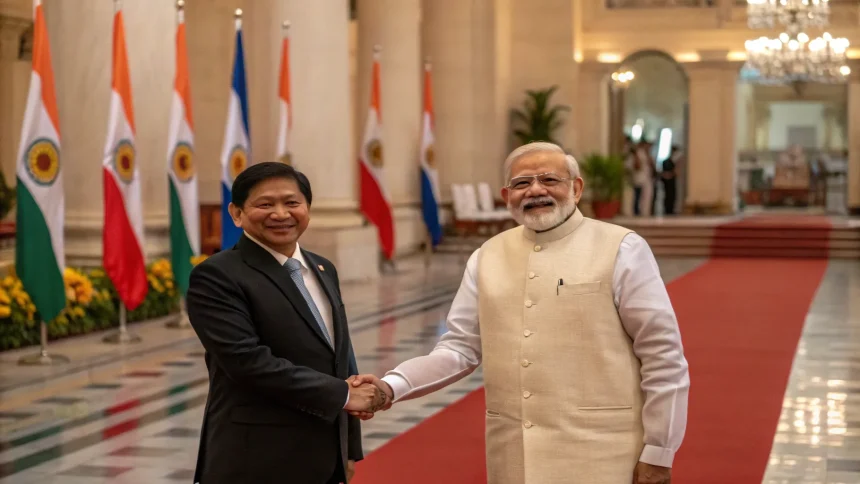Philippines President Ferdinand Marcos Jr. received a ceremonial welcome from Prime Minister Narendra Modi at Rashtrapati Bhavan, highlighting a key diplomatic engagement between the two nations. The formal reception sets the stage for discussions aimed at deepening the relationship between India and the Philippines across multiple strategic areas.
The high-profile visit comes as both countries seek to enhance their partnership in response to changing regional dynamics. Officials from both sides have indicated that the talks will focus on expanding cooperation in defense, maritime security, and trade while addressing shared concerns about stability in the Indo-Pacific region.
Strategic Partnership in Defense and Maritime Security
Defense collaboration appears to be a central focus of the discussions between the two leaders. Both India and the Philippines face similar security challenges in their respective maritime domains and have expressed interest in strengthening military ties.
Maritime security cooperation is particularly relevant given both nations’ strategic locations. The Philippines, with its extensive coastline in the South China Sea, and India, with its significant presence in the Indian Ocean, share concerns about freedom of navigation and territorial integrity in these waters.
A senior diplomatic source familiar with the agenda noted that “both countries recognize the value of coordinated approaches to maritime security challenges that affect the broader Indo-Pacific region.”
Economic and Trade Relations
Beyond security matters, the leaders are expected to discuss ways to boost bilateral trade and investment. Current trade figures between India and the Philippines remain modest compared to their potential, with opportunities for growth in sectors including pharmaceuticals, information technology, agriculture, and renewable energy.
The economic discussions come at a time when both countries are looking to diversify their international partnerships and reduce economic dependencies on certain trading partners.
Key areas for potential economic cooperation include:
- Digital technology and IT services
- Pharmaceutical manufacturing and distribution
- Agricultural trade and food security
- Infrastructure development projects
Regional Stability in the Indo-Pacific
The meeting between Modi and Marcos takes place against the backdrop of increasing focus on the Indo-Pacific region as a strategic theater. Both India and the Philippines have expressed support for a free, open, and inclusive Indo-Pacific based on respect for international law.
The two nations share concerns about territorial disputes and the need for peaceful resolution of conflicts in accordance with international norms. Their alignment on these issues reflects a broader trend of like-minded countries in the region working to maintain stability.
“This visit represents an important step in building a network of partnerships committed to maintaining regional peace and security,” said a foreign policy analyst tracking Indo-Pacific developments.
Historical Context of India-Philippines Relations
Diplomatic relations between India and the Philippines date back to 1949, shortly after both nations gained independence. However, despite these long-standing ties, the relationship has often been described as having untapped potential.
The current engagement marks a more deliberate effort to elevate the partnership to a level that reflects both countries’ growing importance in regional affairs. Cultural connections, including shared historical experiences with colonialism and a commitment to democratic values, provide a foundation for deeper engagement.
The ceremonial reception at Rashtrapati Bhavan, India’s presidential palace, follows diplomatic protocol reserved for important state visits and signals the significance India attaches to its relationship with the Philippines.
As discussions progress between the two leaders, observers anticipate concrete outcomes in the form of agreements or memorandums of understanding that could formalize cooperation in the identified priority areas. The visit represents not just a diplomatic formality but a substantive opportunity to shape the future direction of India-Philippines relations in an increasingly complex regional environment.







